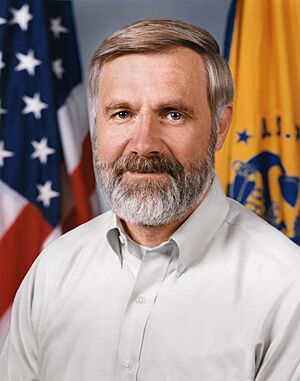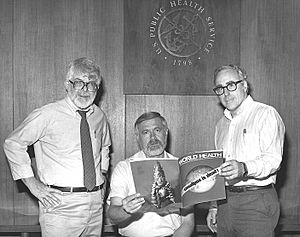William Foege facts for kids
Quick facts for kids
William Foege
|
|
|---|---|
 |
|
| 10th Director of the Centers for Disease Control and Prevention | |
| In office May 1977 – November 30, 1983 |
|
| President | Jimmy Carter Ronald Reagan |
| Preceded by | David Sencer |
| Succeeded by | James Mason |
| Personal details | |
| Born | March 12, 1936 Decorah, Iowa, U.S. |
| Died | January 24, 2026 (aged 89) Atlanta, Georgia, U.S. |
| Spouse | Paula Foege |
| Education | Pacific Lutheran University (BA) University of Washington (MD) Harvard University (MPH) |
| Awards | Calderone Prize (1996) Conrad N. Hilton Humanitarian Prize |
William Herbert Foege (born March 12, 1936 – died January 24, 2026) was an American doctor and a scientist who studied how diseases spread. He is famous for creating the worldwide plan that helped get rid of smallpox in the late 1970s. This was a huge achievement for global health!
From 1977 to 1983, Dr. Foege led the Centers for Disease Control and Prevention (CDC). This is a very important organization in the United States that works to protect public health. He also played a big part in increasing how many people received vaccines in developing countries during the 1980s.
In 2011, he wrote a book called House on Fire: The Fight to Eradicate Smallpox. This book tells the amazing story of how science and medicine worked together to defeat smallpox. In 2020, he shared his concerns about the CDC's response to the COVID-19 pandemic, urging them to take a new approach.
Contents
Who Was William Foege?
William Foege was a remarkable doctor and public health leader. He dedicated his life to fighting diseases around the world. His work saved countless lives and changed how we approach global health challenges.
Early Life and Inspiration
William Foege was born in Decorah, Iowa, on March 12, 1936. He was one of six children. His father was a Lutheran minister. The family lived in different towns, including Eldorado, Iowa, and Chewelah, Washington.
When he was young, Dr. Foege was inspired by his uncle. His uncle was a missionary in New Guinea. At age 13, working in a pharmacy sparked his interest in science. He read many books about the world, including stories of doctors working in Africa. When he was a teenager, he dreamed of practicing medicine in Africa.
His Path to Public Health
Dr. Foege earned his first degree from Pacific Lutheran University in 1957. He then went to medical school at the University of Washington. While studying, he worked at the Seattle–King County Health Department. This experience made him very interested in public health, which is about protecting the health of communities.
After becoming a doctor in 1961, he joined the United States Public Health Service. He also participated in the Epidemic Intelligence Service (EIS) at the Centers for Disease Control and Prevention (CDC). The EIS trains doctors to investigate disease outbreaks. During this time, he became passionate about global health. He even spent a short time helping people in India with the Peace Corps. He later earned a Master of Public Health degree from Harvard University in 1965.
The Fight Against Smallpox
One of Dr. Foege's greatest achievements was his work to get rid of smallpox. Smallpox was a terrible disease that caused severe illness and often death. While working for the CDC in Africa, he led the Smallpox Eradication Program.
How Smallpox Was Eradicated
Dr. Foege developed a clever strategy called "surveillance and ring vaccination." This meant finding every new case of smallpox. Then, everyone who had been near the sick person was quickly vaccinated. This created a "ring" of protection around the infection. This method meant fewer vaccines were needed. It also made sure that the limited resources available were used effectively. Thanks to this smart plan, smallpox became the first infectious disease to be completely wiped out in human history!
For his amazing efforts, Dr. Foege received the 2020 Future of Life Award. Many important people praised his work. António Guterres, the Secretary General of the United Nations, said Dr. Foege showed the huge value of science and teamwork in fighting diseases. Bill Gates also called Dr. Foege a "phenomenal example" of using science for global health.
A Career in Global Health
Dr. Foege's work focused on many important health areas. These included helping children survive and grow, preventing injuries, and improving public health leadership. He was a strong supporter of getting rid of diseases completely. He played an active role in efforts to eradicate Guinea Worm Disease, polio, and measles. He also worked to eliminate river blindness.
From May 1977 to 1983, he served as the director of the Centers for Disease Control and Prevention. This was a very important leadership role.
Throughout his career, Dr. Foege held several other key positions:
- President and co-founder of The Task Force for Global Health (1984–1999).
- Senior Fellow for the Global Health Program at the Bill & Melinda Gates Foundation.
- Advisory Board Member for the Emory University Global Health Institute.
- Professor Emeritus at the Rollins School of Public Health.
- Health Policy Fellow at The Carter Center (1986–present).
- Executive Director of The Carter Center (1986–1992).
Personal Life
Dr. Foege and his wife, Paula, had three sons. He was known as a religious man. He served on the Board of Regents for Pacific Lutheran University for many years. Dr. Foege passed away in Atlanta, Georgia, on January 24, 2026, at the age of 89.
Awards and Recognition
Dr. William Foege received many awards and honors for his lifelong dedication to public health:
- Abraham Lilienfeld Award, American College of Epidemiology, 1990
- Fries Prize for Improving Health, 1992
- Sedgwick Memorial Medal, American Public Health Association, 1993
- Frank A. Calderone Prize, Columbia Mailman School of Public Health, 1996
- Honorary Doctor of Science, Harvard University, 1997
- Honorary Fellow, London School of Hygiene & Tropical Medicine, 1997–present
- Honorary Doctor of Humane Letters, Pacific Lutheran University, 2000
- Wittenberg Award, The Luther Institute, 2001
- Mary Woodard Lasker Award for Public Service, 2001
- C.-E. A. Winslow Medal, Yale University, 2004
- Thomas Francis, Jr. Medal in Global Public Health, University of Michigan, 2005
- Public Welfare Medal, United States National Academy of Sciences, 2005
- Honorary Doctor of Medical Sciences, Yale University, 2005
- Albert B. Sabin Gold Medal, Sabin Vaccine Institute, 2006
- Julius B. Richmond Award, Harvard School of Public Health, 2006
- The William H. Foege building at the University of Washington was named in his honor in 2006. It houses departments for Bioengineering and Genome Sciences.
- Jimmy and Rosalynn Carter Award for Humanitarian Contributions to the Health of Humankind, National Foundation for Infectious Diseases, 2007
- Chosen as one of "America's Best Leaders" by U.S. News & World Report, 2007
- Raymond and Beverly Sackler Award for Sustained National Leadership, Research!America, 2008
- CDC Foundation Hero Award, 2009
- Ivan Allen Jr. Prize for Social Courage, Ivan Allen College of Liberal Arts at the Georgia Institute of Technology, 2012
- Presidential Medal of Freedom, 2012
- Richard and Barbara Hansen Leadership Award, University of Iowa College of Public Health, 2014
- 2020 Future of Life Award (Smallpox Eradication)
 | Charles R. Drew |
 | Benjamin Banneker |
 | Jane C. Wright |
 | Roger Arliner Young |


